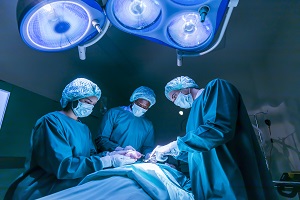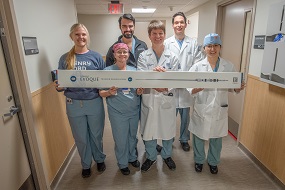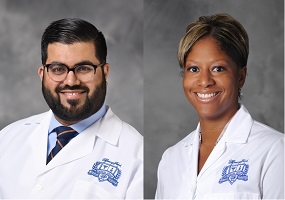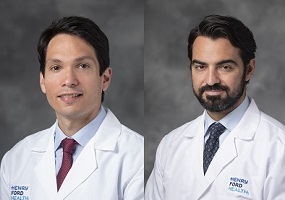
Center for Structural Heart Disease
At the Center for Structural Heart Disease, we specialize in problems affecting your heart’s valves, muscles and walls. Our innovations protect your heart and health and help you enjoy a more active life.
Even if other doctors have told you they can’t treat you, our team can often provide effective options. We specialize in minimally invasive approaches that are easier on your body. From diagnosis to recovery, we’re with you at every step, for all types of structural heart conditions.
Learn more about:

Why choose Henry Ford Health for structural heart disease care?
We treat even the most complicated cases of structural heart disease, often with procedures that avoid surgery. Our team continues to play a leading role testing new treatment devices and creating new techniques using catheters, or thin tubes. At our program, you benefit from:
- Options: We constantly look to make treatment safer and more effective, for a wider range of people. If there’s a minimally invasive approach, our interventional cardiologists offer it. In addition to approved treatments, we’re involved in a wide range of clinical trials, many only available at select programs. Should you need surgery, our team includes top cardiac surgeons.
- Teamwork: Treating structural heart disease takes a joint effort. Our team is solely focused on these conditions and includes doctors, nurses and support staff. Your team meets weekly to discuss your case and potentially make adjustments to your care. We work with you to make sure you get the most appropriate recommendations.
- Expertise and experience: Our specialists are among the world’s leading structural heart disease experts, training other doctors and sharing knowledge through conferences and journals. We’ve provided care longer and treated more cases than many other programs. For example, we see more aortic valve and mitral valve cases than 90 percent of the nation’s medical centers.
- Attention: No two hearts are exactly alike. We appreciate that you have a unique anatomy and take the time to thoroughly evaluate your heart. We use this information for precise planning. We make your comfort and safety a priority.
Innovations to help you live healthier, longer
Our team is instrumental in improving structural heart disease treatment, following the example of our medical director emeritus, the world-renowned William O’Neill, M.D. Our advancements in heart care include:
- Transcatheter aortic valve replacement (TAVR): Among his many achievements, Dr. O’Neill performed the country’s first TAVR. In most cases, doctors use the femoral artery near the groin to access the heart for this procedure. But we’ve developed techniques to use alternative blood vessels, so more people can benefit. We also helped develop the BASILICA procedure to make TAVR safer.
- Transcatheter mitral valve repair (TMVr) or replacement (TMVR): We participated in trials that helped make minimally invasive repair an option for people who can’t have surgery. We’re now studying additional repair devices, as well as new valves for those who need a full replacement. Learn more about TMVR.
- Tricuspid valve treatment: We’re exploring ways to replace the tricuspid valve without surgery. We’re also one of the few centers running a clinical trial of catheter-based repair. Learn more about heart valve repair and replacement.
- Advanced imaging and 3D printing: We’re known nationally for creating new and better ways to view the heart. We’re among the few centers using imaging to create 3D models of the heart for complicated cases. Our doctors also developed a test to watch for complications during mitral valve replacement.
Show Me


Henry Ford Health Heart Failure Patient First in Michigan to Receive Breakthrough Device

Henry Ford Health Cardiologists Lead National Study on Novel Bleeding Monitoring System
Novel technology monitors and lowers bleeding complications in patients undergoing heart procedures.

.svg?iar=0&hash=F6049510E33E4E6D8196C26CCC0A64A4)

/hfh-logo-main--white.svg?iar=0&hash=ED491CBFADFB7670FAE94559C98D7798)
